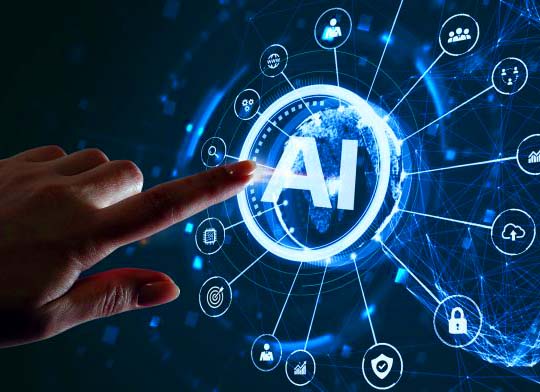In today’s rapidly evolving world, where technology has become an integral part of our lives, one field that holds immense promise is Artificial Intelligence (AI). With its ability to process vast amounts of data and learn from it, AI has the potential to revolutionize various aspects of our society and address some of the most pressing challenges we face. From scientific breakthroughs to environmental protection and social issues, AI is proving to be a powerful tool in shaping a better future for humanity. In this article, we will explore the ways in which AI can save the world, with a specific focus on scientific advancements, its role in addressing climate change, and even discuss how to use GPT-4 for free, the latest AI model that builds upon its predecessors’ capabilities.
Scientific Breakthroughs: Decoding the Laws of Nature
One of the most significant contributions of AI to humanity is its potential to unlock scientific breakthroughs. By leveraging the power of machine learning algorithms, AI systems can analyze vast amounts of data and identify patterns that might go unnoticed by human scientists. In fields such as medicine and technology, AI has already demonstrated its ability to accelerate research and make groundbreaking discoveries.
For instance, in the field of medicine, AI algorithms can sift through enormous datasets of patient records, genetic information, and medical literature to identify correlations and potential treatments. This has the potential to revolutionize personalized medicine by enabling doctors to deliver precise diagnoses and develop targeted therapies. Furthermore, AI can assist in drug discovery, predicting the efficacy of new compounds and accelerating the process of bringing life-saving drugs to market.
Similarly, in the realm of technology, AI can help scientists unlock the mysteries of the universe by processing astronomical data and detecting subtle patterns that may lead to new scientific theories. AI algorithms can analyze massive datasets from telescopes and satellites, aiding astronomers in identifying celestial objects, mapping the universe, and unraveling the secrets of dark matter and dark energy.
In summary, AI’s ability to analyze vast amounts of data and uncover hidden patterns has the potential to drive scientific breakthroughs in fields such as medicine and technology, paving the way for a better understanding of the laws of nature and improving the quality of human life.
Environmental Protection: Safeguarding the Planet
The alarming pace of climate change and the degradation of our environment call for urgent action. Fortunately, AI offers innovative solutions to tackle these global challenges and protect our planet for future generations. By harnessing the power of AI, we can monitor and reduce pollution, predict natural disasters, and promote sustainable practices.
Monitoring the Climate: Insights for a Sustainable Future
AI can be integrated into devices that monitor the climate, allowing us to collect and analyze real-time data about various environmental factors. These devices, equipped with sensors and AI algorithms, can detect changes in temperature, humidity, air quality, and other vital parameters. By continuously monitoring the climate, AI-powered systems can help scientists and policymakers make data-driven decisions and take proactive measures to mitigate the negative effects of climate change.
Moreover, AI can draw important conclusions about the direction in which our climate is heading. By analyzing historical climate data and current trends, AI algorithms can generate insights that help us understand the long-term impacts of climate change. This knowledge empowers us to develop effective strategies and policies to adapt to these changes and minimize their adverse effects.
Weather Forecasting: Enhancing Preparedness and Resilience
Accurate weather forecasting is crucial for mitigating the impact of natural disasters and planning effective emergency responses. AI can significantly enhance weather prediction capabilities by analyzing vast amounts of meteorological data and identifying complex patterns. By leveraging machine learning algorithms, meteorologists can improve the accuracy and timeliness of weather forecasts, enabling individuals, communities, and governments to make informed decisions and take necessary precautions.
For example, AI-powered weather forecasting models can provide early warnings for severe storms, hurricanes, or heat waves, allowing authorities to evacuate vulnerable areas and allocate resources effectively. This proactive approach can save lives and minimize the damage caused by natural disasters.
Using GPT 4 AI In Different Field
Here are some potential ways in which GPT-4, the latest AI model, could be harnessed to contribute to saving the world:
- Medical diagnosis and treatment: GPT-4 possesses the capability to process vast amounts of medical information, aiding doctors in saving lives within emergency rooms. It can swiftly and accurately diagnose patients, as well as provide recommendations for treatments.
- Coding: GPT-4 showcases its proficiency in generating code across various prominent programming languages. By analyzing images and writing code, it simplifies and enhances the coding process, making it more efficient for programmers.
- Problem-solving: GPT-4’s problem-solving abilities extend to video games like Minecraft. It can assist in generating objectives that facilitate game agents’ exploration and refinement of code, utilizing error messages and feedback from the game to improve performance.
- Website creation: With GPT-4’s assistance, transforming drawings into fully functional websites can be accomplished within minutes. This advancement has the potential to make website creation more accessible and streamlined for users.
- Language translation: GPT-4 exhibits a high level of accuracy in language translation. This proficiency could prove instrumental in enabling effective communication across language barriers, empowering individuals to connect and understand one another more effectively.
Sustainable Practices: Optimizing Resource Management
AI can also play a vital role in promoting sustainable practices and optimizing resource management. By analyzing data from various sources, such as energy consumption patterns, transportation systems, and waste management, AI algorithms can identify inefficiencies and suggest improvements that reduce our ecological footprint.
For instance, AI-powered systems can optimize energy distribution by analyzing real-time data on energy supply and demand. By adjusting energy generation and distribution based on these insights, we can reduce energy waste and promote the use of renewable energy sources, ultimately contributing to a greener and more sustainable future.
Furthermore, AI can optimize transportation systems by analyzing traffic patterns, public transportation usage, and other relevant data. By providing real-time recommendations on route optimization, public transportation scheduling, and ride-sharing options, AI can help reduce congestion, lower fuel consumption, and minimize air pollution.
Ethical Considerations and Responsible AI
While AI holds tremendous potential to save the world, it is essential to address the ethical considerations and ensure responsible AI development and deployment. As we leverage AI for scientific breakthroughs and environmental protection, we must prioritize transparency, fairness, and accountability.
Developing AI systems that are transparent and explainable enables us to understand the underlying processes and decisions made by AI algorithms. This transparency is crucial in ensuring that AI is used responsibly and that potential biases or unintended consequences are identified and addressed.
Additionally, fairness and inclusivity should be integral to AI development. AI systems should be trained on diverse datasets and undergo rigorous testing to ensure they do not perpetuate biases or discriminate against certain groups of people.
Lastly, the responsible use of AI requires ongoing monitoring, evaluation, and regulation. Governments, organizations, and researchers must collaborate to establish guidelines and policies that govern AI development, deployment, and data privacy to protect individuals and society as a whole.
Conclusion
Artificial Intelligence has the potential to save the world by unlocking scientific breakthroughs, addressing climate change, and promoting sustainable practices. Through its ability to process vast amounts of data, AI can accelerate research, enable personalized medicine, and aid in the discovery of new technologies. In the realm of environmental protection, AI can monitor the climate, enhance weather forecasting, and optimize resource management, leading to informed decision-making and sustainable practices.
However, it is crucial to approach AI development and deployment with ethics and responsibility in mind. Transparency, fairness, and accountability should be prioritized to ensure that AI benefits everyone and does not perpetuate biases or harm individuals. By harnessing the power of AI while maintaining ethical standards, we can unleash its full potential and work towards a better future for all.







